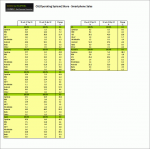
New figures out today from Kantar Worldpanel ComTech — a market research division of WPP — show that Android is, overall, continuing to make large gains in the smartphone market, accounting for a majority of sales in the 12 weeks that ended March 18.
Drilling down, Android is doing particularly well in some places. In Spain, Android is the platform to beat. It accounted for a 72.3 percent of smartphone sales in the period — the highest proportion among the markets analyzed by Kantar. But Android’s domination is not across the board: in the U.S., sales of devices based on Google’s platform actually declined by about 6.6 percent over last year and accounted for 47.6 percent of all smartphone sales in the country. Apple, meanwhile, saw its percentage of sales in the U.S. go up by 12.8 percent to account for 43 percent of all sales. Kantar also says that while now the majority of consumers in the UK and Australia now own smartphones, in other markets that it analyses, the tipping point has yet to be reached.
Kantar notes that in Australia, 57 percent of mobile consumers now own smartphones; and in the UK, 53.1 percent own smartphones. But in Germany the percentage is at 32 percent; France at 40 percent; Italy at 39 percent; Spain at 37 percent; and the U.S. at 38 percent.
Those figures are a moving target, though. In the UK, for example, Kantar’s analyst Dominic Sunnebo notes that in the next year, 22 million consumers aged over 13 will be buying mobile devices in the next year and some 80 percent of them are expected to buy a smartphone.
In Spain, Android also saw the biggest gains in terms of sales in the last 12 weeks: its 72.3 percent share of sales represented a huge rise of nearly 40 percent on a year ago. The platform saw similarly large growth in Germany (up 27.2 percent to represent 61.8 percent of sales); France (17 percent up to 54.6 percent); Italy (up by 29.3 percent to account for 48.5 percent of all sales) and Australia (up nearly 20 percent for 52 percent of all sales).
Kantar notes that among the top Android makers in the last quarter, Samsung and HTC were selling the strongest, together accounting for 86 percent of all sales in the the UK, for example. He notes that the HTC One X has been selling particularly well since its launch. In contrast, Sony only had 10.4 percent of Android sales in the past 12 weeks and LG had less than 1 percent in the UK.
Among other platforms, Symbian’s share declined across the board: Nokia’s legacy smartphone platform lost between 9 percent and 36 percent sales market share in the countries covered by Kantar Worldpanel. Sales of Windows Phone — the platform that Nokia is now using as its primary smartphone platform — are yet to make up for that. In markets where Microsoft’s OS saw gains (Spain being an exception), growth was in the low single digits in all cases — as was the total share of sales attributed to the platform. Windows Phone’s highest share of sales was in Germany, where it accounted for 6.2 percent of smartphone sales: that’s including all manufacturers building on Windows Phone, not just Nokia.


